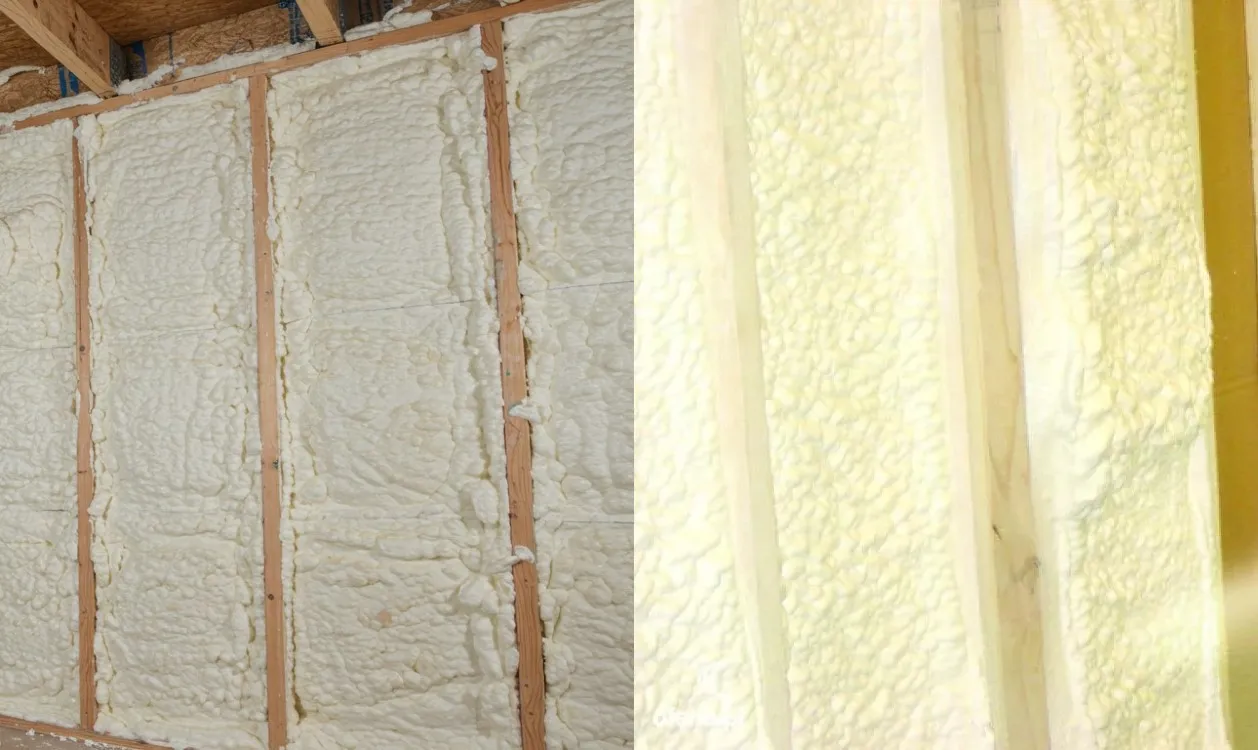Creating a quieter home environment is a priority for many homeowners in Blaine County. Whether it’s reducing street noise, limiting sound transfer between rooms, or maintaining a peaceful atmosphere, insulation plays a key role. Open-cell and closed-cell spray foam insulation both offer soundproofing benefits, but they function differently. Understanding their strengths and limitations can help you make an informed decision.
Understanding Spray Foam Insulation
Spray foam insulation is a versatile material that expands upon application, filling gaps and creating an airtight seal. It enhances energy efficiency while reducing noise transmission. There are two primary types:
- Open-cell spray foam: A softer, more flexible material with a porous structure that helps absorb sound.
- Closed-cell spray foam: A denser and more rigid foam that provides both insulation and soundproofing benefits.
How Open-Cell Insulation Affects Soundproofing
Open-cell foam is known for its sound absorption properties. Its porous nature allows it to trap sound waves, reducing noise transmission. Key characteristics include:
- Soft and flexible structure: Helps absorb and dissipate sound energy.
- Ideal for interior walls and ceilings: Works well in residential settings where reducing echo and airborne noise is a priority.
- More affordable than closed-cell foam: Cost-effective for large areas requiring soundproofing.
- Less effective at blocking low-frequency sounds: May not be the best choice for environments with heavy impact noise.
How Closed-Cell Insulation Contributes to Noise Reduction
Closed-cell foam provides a higher density barrier, making it effective at blocking sound transmission. It works by:
- Creating a rigid barrier: Helps block sound waves rather than absorbing them.
- Providing structural reinforcement: Adds strength to walls, reducing vibrations and movement that can amplify noise.
- Performing well in mixed-use areas: Ideal for garages, home theaters, or locations exposed to external noise sources.
- Higher cost but better overall performance: More expensive than open-cell foam but offers superior durability and soundproofing.
Comparing Open-Cell and Closed-Cell Insulation for Soundproofing
| Feature | Open-Cell Foam | Closed-Cell Foam |
| Sound Absorption | High | Moderate |
| Sound Blocking | Low | High |
| Cost | Lower | Higher |
| Rigid Structure | No | Yes |
| Energy Efficiency | Good | Excellent |
| Moisture Barrier | No | Yes |
Choosing the Right Insulation for Your Needs
The best choice depends on your specific needs:
- If reducing echoes and absorbing sound within a room is the goal, open-cell foam is a practical option.
- If blocking noise from entering or leaving a space is the priority, closed-cell foam is more effective.
- For mixed applications, combining both types in different areas can optimize results.
A Smart Investment in Comfort
Soundproofing your home enhances comfort and privacy. With proper insulation, you can reduce distractions, improve focus, and create a more enjoyable living environment. Valley Spray Works provides expert insulation services tailored to your needs. Call (208) 539-5281 or email [email protected] to learn more about the best options for your home.
FAQs
Which type of spray foam is better for soundproofing?
Both types have advantages. Open-cell foam absorbs sound, making it effective for reducing echoes, while closed-cell foam blocks sound transmission more effectively.
Is spray foam insulation enough for complete soundproofing?
Spray foam significantly reduces noise but works best when combined with other soundproofing materials like mass-loaded vinyl or acoustic panels.
Does closed-cell insulation reduce echoes?
No, closed-cell foam is better at blocking noise rather than absorbing it. Open-cell foam is more effective at reducing echoes.
Can I use both types of spray foam in my home?
Yes, combining both types can enhance soundproofing. Open-cell foam works well for interior walls, while closed-cell foam is effective for exterior walls and ceilings.
How much does spray foam insulation cost?
Costs vary based on area size and material type. Open-cell foam is generally more affordable, while closed-cell foam offers better performance at a higher cost.
Does spray foam insulation help with temperature control?
Yes, both types provide thermal insulation, with closed-cell foam offering the highest energy efficiency.
Is spray foam insulation safe?
Yes, once cured, spray foam is safe and does not release harmful chemicals. Proper installation is key to safety and effectiveness.
How long does spray foam insulation last?
Spray foam insulation can last several decades with proper installation, making it a long-term investment.
Can spray foam insulation reduce noise from neighbors?
Yes, especially closed-cell foam, which blocks sound transmission effectively.
Who can install spray foam insulation in Blaine County?
Valley Spray Works offers professional spray foam insulation services. Contact (208) 539-5281 or email [email protected] for expert advice.



